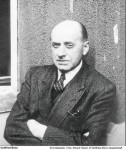Though Gottfried Benn can scarcely be said to exist in the English-speaking world, there are a surprising number of prominent mentions of him. T. S. Eliot for instance, in his essay “The Three Voices of Poetry” goes so far as to associate one such voice—the first, “the voice of the poet talking to himself—or to nobody”—with Benn. John Berryman allows him the end of one Dream Song, no 53: “and Gottfried Benn / said: “we are using our own skins for wallpaper and we cannot win.” In his novel Plexus Henry Miller is careful to leave the 1927 issue of Eugene Jolas’ avant-garde magazine, transitions, lying around, and quotes in extenso from Benn’s essay in it. Frank O’Hara has a tilt at him in one of his invariably disastrous and perplexing diatribes, when he seems to have his ill-fitting Hector the Lecturer suit on: “Poetry is not instruments / that work at times / then walk out on you / laugh at you old / get drunk on you young / poetry’s part of your self.” (“To Gottfried Benn”)
With all these appearances, you would have thought Benn had to have some being somewhere. But it’s more like that space radiation called “chatter”; there’s something that leads our instruments to think there’s something “out there”; we might even give it a name, but most of us remain doubtful, and few of us expect ever to see it. I don’t think you could fill a room with a conversation about Benn—non-Germans and non-Germanists, that is. And yet we’re talking of someone of the eminence, say, of Wallace Stevens, someone most Germans (and most German poets, too) would concede as the greatest German poet since Rilke…
Read more in Little Star Weekly
Gottfried Benn (1886–1956) was the leading poet of German expressionism and author of many brilliant essays and dialogues. As a persistently intermittent army doctor, he was briefly formally a Nazi (as Hofmann writes, “for a brief while it looked to him as though his long-range ideas about the human species, his cultural pessimism, his Nietzschean and Spenglerian gloom has somewhere to dock”), but by 1938 he was banned as “degenerate” along with his fellow expressionists and, as Hofmann writes, “the relationship’s fleeting appearance of compatability shaded into, or gave way to its natural level of implacable—and for Benn, extremely threatening—mutual detestation.” He remained at odds with officialdom and the practical business of living for the rest of his life, though he grew in reputation, writing and practicing medicine in Berlin, and winning the coveted Georg Büchner Prize in 1951.
Michael Hofmann is the author of several books of poems and many translations from the German, including work published in Little Star by Durs Grünbein and Wolfgang Koeppen. He edited Twentieth-Century German Poetry. Most of this essay first appeared over several issues of Poetry magazine. It forms the introduction to Impromptus: Selected Poems and Some Prose, by Gottfried Benn, translated by Michael Hofmann, published by Farrar, Straus & Giroux.
Photo: Erhard Hüsch, Gottfried-Benn-Gesellschaft

